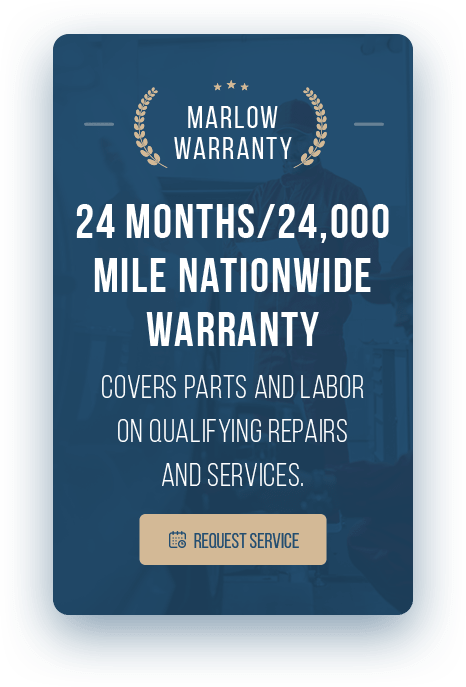The importance of a vehicle’s braking system cannot be overstated, as it plays a critical role in ensuring the safety and performance of your car, truck, or SUV. However, despite its significance, the world of brakes is filled with myths and misconceptions that can lead to confusion, misinformation, and suboptimal vehicle care. As a responsible vehicle owner, it’s crucial to separate fact from fiction to make informed decisions that can significantly impact the performance, longevity, and overall safety of your braking system.
Marlow Automotive will debunk some of the most common brake myths, helping you understand the reality behind these misconceptions and providing you with the knowledge necessary to optimize your brake system’s performance and durability. From brake pad quality and replacement intervals to the importance of regular brake fluid changes, we’ll examine various beliefs surrounding brake components and maintenance practices, bringing clarity to these often misunderstood topics.
Myth #1: All Brake Pads Are Created Equal
Fact: Brake pads are available in a variety of materials, each with its own set of characteristics and performance attributes. Common materials used in brake pads include organic, semi-metallic, and ceramic compounds. Organic pads are generally more cost-effective and generate less noise but have a shorter lifespan and produce more brake dust. Semi-metallic pads provide better heat absorption and friction but are noisier and can wear down rotors more quickly. Ceramic brake pads are quieter, produce minimal dust, and have a long lifespan but tend to be more expensive. Ultimately, the best brake pad choice depends on your specific needs, vehicle type, and driving habits.
Myth #2: Brake Rotor Replacement is Always Necessary When Changing Brake Pads
Fact: Rotor replacement is not always mandatory when changing brake pads. In many cases, rotors can be resurfaced to remove minor imperfections and wear patterns, restoring their performance and extending their lifespan. However, if the rotors are warped or damaged beyond repair, replacement will be necessary. It is essential to have a professional technician inspect your rotors during a brake pad replacement to determine the best course of action based on their condition.
Myth #3: Brake Fluid Changes Are Not Necessary
Fact: Regular brake fluid changes are a crucial aspect of maintaining your braking system’s safety and performance. Over time, brake fluid absorbs moisture, which can lead to decreased boiling points, increased corrosion, and ultimately, compromise the brake system’s efficiency. Most vehicle manufacturers recommend changing the brake fluid every 2-3 years or 24,000-36,000 miles. Scheduling regular brake fluid changes is a crucial step in preserving your vehicle’s brake system functionality.
Myth #4: New Brake Pads and Rotors Require a "Break-In" Period
Fact: Contrary to popular belief, there is no specific “break-in” period required for new brake pads and rotors. However, it’s important to note that an initial period of gentle braking is advisable to help ensure even distribution of the pad material onto the rotor, promoting optimal friction and brake performance. Engaging in hard, aggressive braking immediately after installing new brake components can lead to uneven pad deposition and rotor glazing, negatively impacting brake performance. To avoid these issues, remember to drive cautiously and brake smoothly for the first few miles after replacing a brake pad or rotor.
Myth #5: The ABS System Makes Your Vehicle Stop Faster
Fact: The primary function of the Anti-lock Brake System (ABS) is not to reduce stopping distances but to maintain steering control by preventing the wheels from locking up during hard braking. This allows you to steer your vehicle while braking, making it easier to avoid obstacles on the road. Although ABS may provide shorter stopping distances on some surfaces, its primary purpose is to help you maintain control of your vehicle during emergency braking situations.
Conclusion: Knowledge Empowers Brake System Care and Decision-Making
As we’ve seen, the world of brakes is laden with myths and misconceptions that can lead to confusion and misinformation. By debunking these common myths and arming yourself with accurate knowledge regarding brake components and maintenance practices, you can make better decisions when caring for your vehicle’s braking system, ultimately ensuring optimal performance, longevity, and overall safety on the road.
Our team at Marlow Automotive is passionate about sharing our expertise and empowering our clients with the knowledge they need to maintain their vehicles in peak condition. Understanding the truth behind these brake myths’ll pave the way to better brake system care and a safer, more enjoyable driving experience for years to come. Trust our team of capable technicians for a comprehensive range of brake services in Plano, TX, including inspections, pad replacements, rotor care, and fluid changes, and let us help you stay informed and confident in your vehicle’s braking performance. Contact us today to schedule your next brake service.


